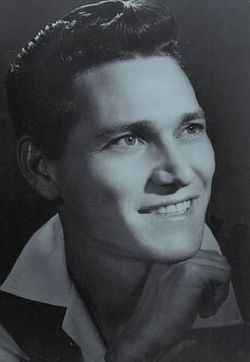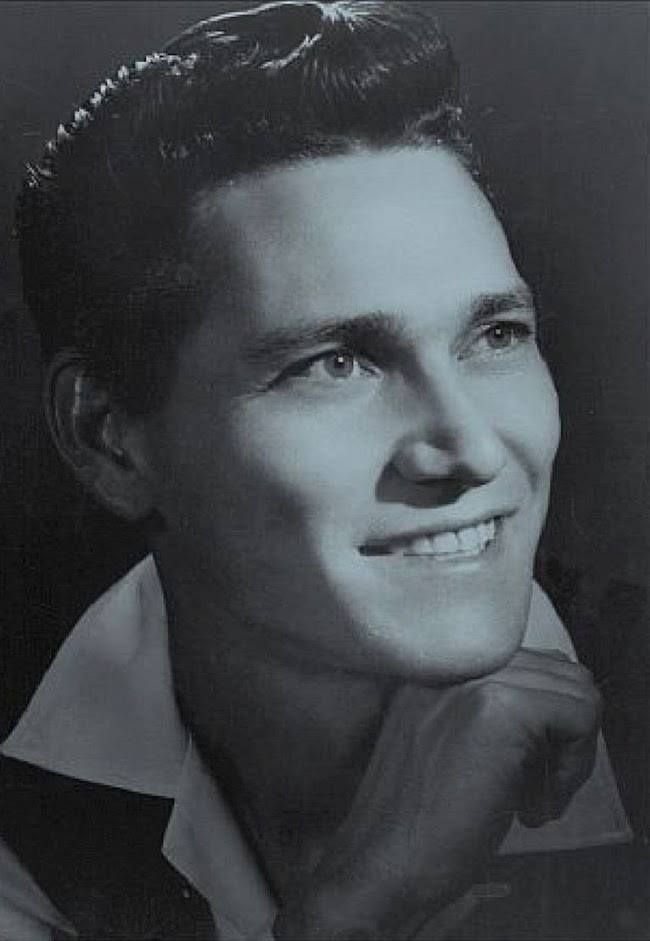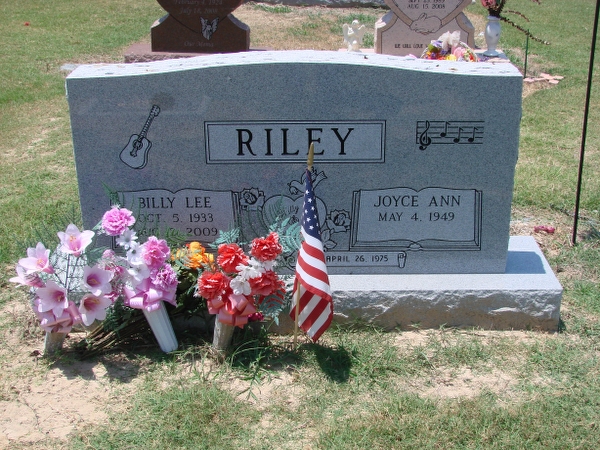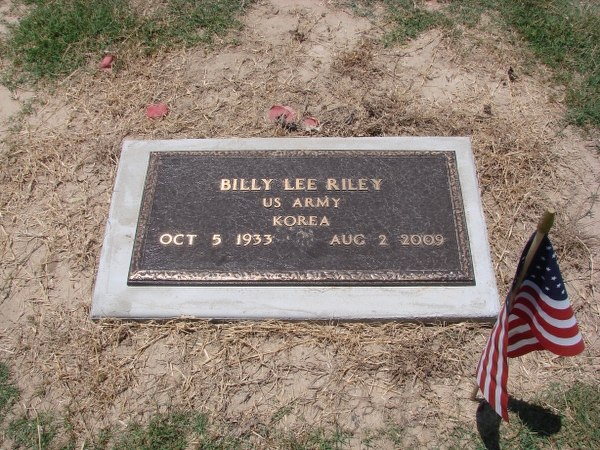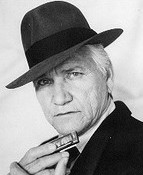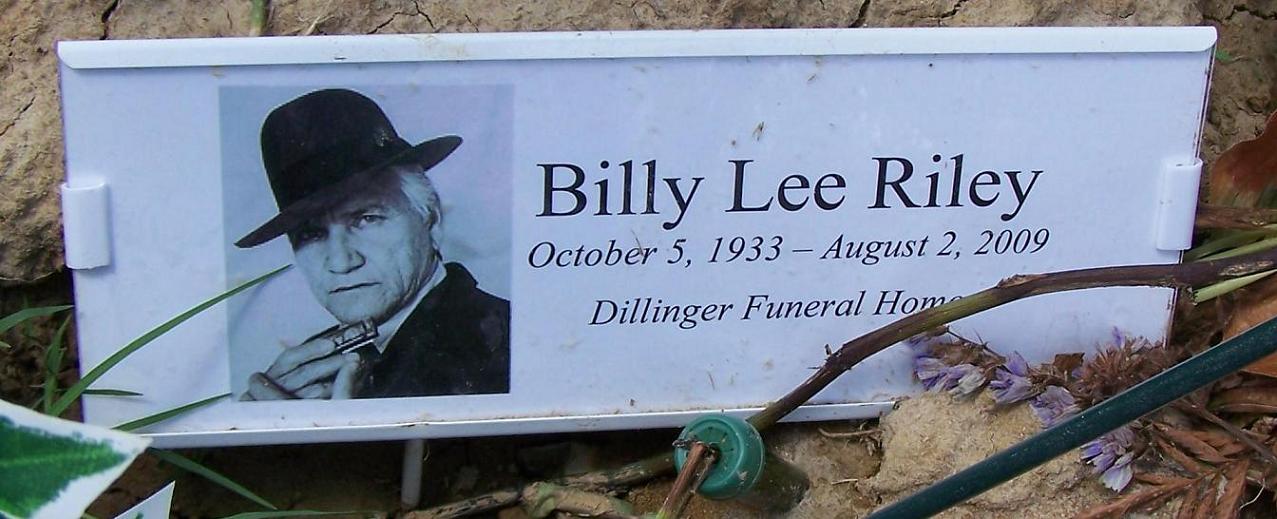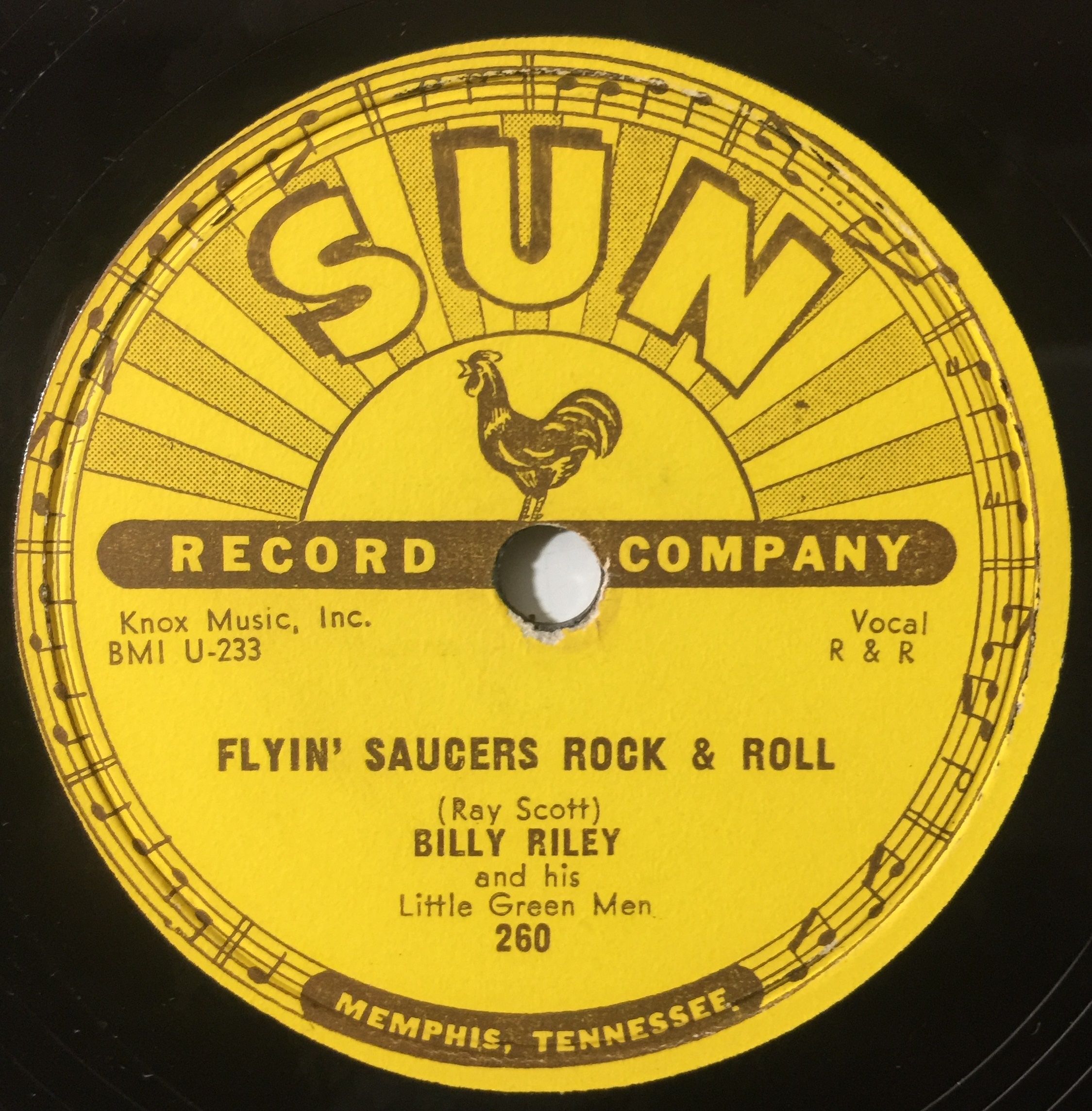Billy Lee Riley, 75 of Jonesboro passed away Sunday, August 2, 2009 at Jonesboro. He was a member of the Jonesboro Northside Church of Christ.
Mr. Riley was preceded in death by his parents, Amos and Helen (Smith) Riley; four brothers and two sisters.
Billy was born to a sharecropper family at the end of the great depression. His career has spanned 5 decades and he has made his mark in each one of them.
In the 50's he recorded Flying Saucer Rock and Roll which was his first hit record. Recording at Sun Studio's in Memphis, Tennessee, Riley was the back up for many of the performers who came through the door to do session work at Sun. His guitar and harmonica work was called into play for any performer without a band. Joining him during these sessions were Roland James and J.M. Van Eaton. These three formed a group called the Little Green Men the name drawn from Riley first hit.
During the 60's Billy Lee moved to Los Angeles. The first year was hard but eventually he became one of the hottest session men in LA working with such greats as Herb Alpert, Sammy Davis Jr., The Beach Boys, Pearl Bailey, and many more. Riley say's that working with Sammy Davis Jr. was one of the high points of his long career.
The 70's found Billy Lee with a new audience. Europe had discovered Rock and Roll and the original rock and rollers were hot commodities. The Europeans loved the real stuff and they wanted it in the flesh. The music that had been just rock and roll was now called Rockabilly and the Rock and Rollers from the 50's could play all they wanted if they were willing to go abroad. England, France, Sweden, Germany, were all part of the tours. Just about everywhere on the European continent there was some kind of Rockabilly Festival. There were Swedish Rockabilly Bands, and English Rockabilly Bands, German, Austrian, etc. all on stage playing the music and getting into the style of the early rockers.
The 80's brought more touring in Europe, with long sabbaticals in Newport. Billy Lee began playing the music he grew up on. The music of the plantations, call it Gut Bucket Blues or Deep Blues, or Delta Blues it was the foundation for Rock and Roll and it was the foundation for Billy Lee Riley's new career in the Blues. Billy Lee's choice to turn to the Blues genre was not a big step for him; the Blues were always part of his performances but now they were the major part.
In the early 90's the Smithsonian found Billy Lee and interviewed him for their archives, he released his first all Blues CD "Blue Collar Blues" in 1992.
He is survived by his wife, Joyce (Martin) Riley; one son, Darron Riley of Jonesboro, three daughters, Angela Riley Johns and husband Ryan of Trumann, Wendy Kennedy and husband Chris of California, and Erin Riley of California; two grandchildren; Lauryn Johns of Trumann and Stella Polling of California; two brothers, Donald Riley of Lake City and Hiawatha Riley of Walnut Ridge; one sister, Margaret Simpson of Memphis; a host of nieces and nephews and a world of adoring fans.
Graveside services will be 3:00 Tuesday, August 4, 2009 in Walnut Grove Cemetery with Brother Simon Harris officiating.
There will be no visitation.
*~*~*~*~*~*~*~*~*~*~*~*~*~*~*~*~*~*~*
Article from The Commercial Appeal...
Sun Records' 'lost giant' Billy Lee Riley dies at 75
By Bob Mehr, Memphis Commercial Appeal
Sunday, August 2, 2009
The sky grew dimmer on Sunday, as another great ray of light from the Sun Records roster, Billy Lee Riley, died. Riley, who'd been battling cancer since May, died at St. Bernards Medical Center in Jonesboro, Ark., after being admitted on Saturday. He was 75.
Billy Lee Riley delivers his signature Sun Studio rockabilly sound at the Beale Street Music Festival in this 2007 file photograph.
Billy Lee Riley delivers his signature Sun Studio rockabilly sound at the Beale Street Music Festival in this 2007 file photograph.
Although Riley had been diagnosed with stage four colon cancer, which had spread to his bones, his wife, Joyce Riley, said the singer was feeling optimistic. "We weren't thinking the end was coming so soon," said Joyce. "He was actually feeling better lately. So the very end was unexpected. But, he went peacefully."
One of Memphis' truly unique rock and roll characters, Riley is considered by many to be Sun Records' lost giant. A true multi-threat, he possessed the myriad musical gifts of Carl Perkins, the unhinged spirit of Jerry Lee Lewis, and the punkish insouciance of Elvis Presley -- yet fate never rewarded Riley beyond cult acclaim.
Born in Pocahontas, Ark., in 1933 to a poor sharecropping clan, Riley developed a passion for blues and learned to pick guitar watching the older black musicians his family worked alongside.
Although he made some early appearances performing on local radio, Riley's career took shape after he was discharged from the Army in the mid-'50s. Moving to Memphis, Riley soon hooked up with a crew of fledgling country musicians that included "Cowboy" Jack Clement.
Clement and his truck driver partner, Slim Wallace, founded the tiny Fernwood label in a South Memphis garage and cut Riley's debut recordings, "Trouble Bound" and "Think Before Your Go." Clement took the tapes to Sam Phillips over at Sun Records so he could master a single. Impressed by what he heard, Phillips ended up hiring Clement to work at Sun, and signed Riley.
Riley and his group -- which included drummer J.M. Van Eaton and guitarist Roland Janes -- would also become the de facto house band at Sun, providing the backing on numerous hits.
Riley is perhaps best remembered for his classic 1957 single, "Flying Saucers Rock and Roll" -- a novelty rockabilly rave-up inspired by the era's U.F.O. mania -- which proved a hit and prompted him to rename his band the Little Green Men.
Despite this promising start, Riley's commercial fate was sealed after Sun put its promotional efforts behind Jerry Lee Lewis' "Great Balls of Fire" -- a song Riley played on -- which zoomed up the charts and past his own follow-up single "Red Hot."
Despite his disappointment, Riley continued to record for Sun and Phillips for several years, before going on to cut sides for Mercury, Atlantic and Crown, as well as his own Nita and Mojo labels, creating a body of work that's been championed by rock critics and notable fans, including Bob Dylan.
In the early 1960s, Riley headed west to California where he became an in-demand studio musician, playing sessions for The Beach Boys, Sammy Davis Jr., and Dean Martin, among others. Riley returned to the South in 1966, and was one of the first artists signed to Shelby Singleton's reactivated Sun Records label in 1969.
Although Riley stepped back from music for a time in the 1970s, working in home decorating, he eventually returned to the stage in 1978, riding the rockabilly revival wave in England. He continued to perform and record for the next three decades, releasing several albums of blues-oriented material.
Though he battled numerous health problems in recent years -- including quadruple bypass heart surgery and a trio of hip replacement operations -- Riley remained a staple of the live circuit in Europe and here at home, where he was one of the perennial acts at the annual Beale Street Music Festival. His final performance came in June, where he appeared with his old Sun labelmate Sonny Burgess during an event at Downtown's Rock and Soul Museum.
In recent weeks, after his cancer diagnosis became public, the international rockabilly community rallied around Riley and his wife as the couple struggled to pay mounting medical bills.
Riley is survived by his wife, Joyce, their daughter Angela Johns, and three children from his first marriage, Erin Riley, Wendy Kennedy, and Darron Riley.
Memorial services are pending, but arrangements will be handled by the Dillinger Funeral Home in Newport, Ark. Those wishing to send condolences or contributions directly can contact: Joyce Riley, Jonesboro, Arkansas, 72401.
Billy Lee Riley, 75 of Jonesboro passed away Sunday, August 2, 2009 at Jonesboro. He was a member of the Jonesboro Northside Church of Christ.
Mr. Riley was preceded in death by his parents, Amos and Helen (Smith) Riley; four brothers and two sisters.
Billy was born to a sharecropper family at the end of the great depression. His career has spanned 5 decades and he has made his mark in each one of them.
In the 50's he recorded Flying Saucer Rock and Roll which was his first hit record. Recording at Sun Studio's in Memphis, Tennessee, Riley was the back up for many of the performers who came through the door to do session work at Sun. His guitar and harmonica work was called into play for any performer without a band. Joining him during these sessions were Roland James and J.M. Van Eaton. These three formed a group called the Little Green Men the name drawn from Riley first hit.
During the 60's Billy Lee moved to Los Angeles. The first year was hard but eventually he became one of the hottest session men in LA working with such greats as Herb Alpert, Sammy Davis Jr., The Beach Boys, Pearl Bailey, and many more. Riley say's that working with Sammy Davis Jr. was one of the high points of his long career.
The 70's found Billy Lee with a new audience. Europe had discovered Rock and Roll and the original rock and rollers were hot commodities. The Europeans loved the real stuff and they wanted it in the flesh. The music that had been just rock and roll was now called Rockabilly and the Rock and Rollers from the 50's could play all they wanted if they were willing to go abroad. England, France, Sweden, Germany, were all part of the tours. Just about everywhere on the European continent there was some kind of Rockabilly Festival. There were Swedish Rockabilly Bands, and English Rockabilly Bands, German, Austrian, etc. all on stage playing the music and getting into the style of the early rockers.
The 80's brought more touring in Europe, with long sabbaticals in Newport. Billy Lee began playing the music he grew up on. The music of the plantations, call it Gut Bucket Blues or Deep Blues, or Delta Blues it was the foundation for Rock and Roll and it was the foundation for Billy Lee Riley's new career in the Blues. Billy Lee's choice to turn to the Blues genre was not a big step for him; the Blues were always part of his performances but now they were the major part.
In the early 90's the Smithsonian found Billy Lee and interviewed him for their archives, he released his first all Blues CD "Blue Collar Blues" in 1992.
He is survived by his wife, Joyce (Martin) Riley; one son, Darron Riley of Jonesboro, three daughters, Angela Riley Johns and husband Ryan of Trumann, Wendy Kennedy and husband Chris of California, and Erin Riley of California; two grandchildren; Lauryn Johns of Trumann and Stella Polling of California; two brothers, Donald Riley of Lake City and Hiawatha Riley of Walnut Ridge; one sister, Margaret Simpson of Memphis; a host of nieces and nephews and a world of adoring fans.
Graveside services will be 3:00 Tuesday, August 4, 2009 in Walnut Grove Cemetery with Brother Simon Harris officiating.
There will be no visitation.
*~*~*~*~*~*~*~*~*~*~*~*~*~*~*~*~*~*~*
Article from The Commercial Appeal...
Sun Records' 'lost giant' Billy Lee Riley dies at 75
By Bob Mehr, Memphis Commercial Appeal
Sunday, August 2, 2009
The sky grew dimmer on Sunday, as another great ray of light from the Sun Records roster, Billy Lee Riley, died. Riley, who'd been battling cancer since May, died at St. Bernards Medical Center in Jonesboro, Ark., after being admitted on Saturday. He was 75.
Billy Lee Riley delivers his signature Sun Studio rockabilly sound at the Beale Street Music Festival in this 2007 file photograph.
Billy Lee Riley delivers his signature Sun Studio rockabilly sound at the Beale Street Music Festival in this 2007 file photograph.
Although Riley had been diagnosed with stage four colon cancer, which had spread to his bones, his wife, Joyce Riley, said the singer was feeling optimistic. "We weren't thinking the end was coming so soon," said Joyce. "He was actually feeling better lately. So the very end was unexpected. But, he went peacefully."
One of Memphis' truly unique rock and roll characters, Riley is considered by many to be Sun Records' lost giant. A true multi-threat, he possessed the myriad musical gifts of Carl Perkins, the unhinged spirit of Jerry Lee Lewis, and the punkish insouciance of Elvis Presley -- yet fate never rewarded Riley beyond cult acclaim.
Born in Pocahontas, Ark., in 1933 to a poor sharecropping clan, Riley developed a passion for blues and learned to pick guitar watching the older black musicians his family worked alongside.
Although he made some early appearances performing on local radio, Riley's career took shape after he was discharged from the Army in the mid-'50s. Moving to Memphis, Riley soon hooked up with a crew of fledgling country musicians that included "Cowboy" Jack Clement.
Clement and his truck driver partner, Slim Wallace, founded the tiny Fernwood label in a South Memphis garage and cut Riley's debut recordings, "Trouble Bound" and "Think Before Your Go." Clement took the tapes to Sam Phillips over at Sun Records so he could master a single. Impressed by what he heard, Phillips ended up hiring Clement to work at Sun, and signed Riley.
Riley and his group -- which included drummer J.M. Van Eaton and guitarist Roland Janes -- would also become the de facto house band at Sun, providing the backing on numerous hits.
Riley is perhaps best remembered for his classic 1957 single, "Flying Saucers Rock and Roll" -- a novelty rockabilly rave-up inspired by the era's U.F.O. mania -- which proved a hit and prompted him to rename his band the Little Green Men.
Despite this promising start, Riley's commercial fate was sealed after Sun put its promotional efforts behind Jerry Lee Lewis' "Great Balls of Fire" -- a song Riley played on -- which zoomed up the charts and past his own follow-up single "Red Hot."
Despite his disappointment, Riley continued to record for Sun and Phillips for several years, before going on to cut sides for Mercury, Atlantic and Crown, as well as his own Nita and Mojo labels, creating a body of work that's been championed by rock critics and notable fans, including Bob Dylan.
In the early 1960s, Riley headed west to California where he became an in-demand studio musician, playing sessions for The Beach Boys, Sammy Davis Jr., and Dean Martin, among others. Riley returned to the South in 1966, and was one of the first artists signed to Shelby Singleton's reactivated Sun Records label in 1969.
Although Riley stepped back from music for a time in the 1970s, working in home decorating, he eventually returned to the stage in 1978, riding the rockabilly revival wave in England. He continued to perform and record for the next three decades, releasing several albums of blues-oriented material.
Though he battled numerous health problems in recent years -- including quadruple bypass heart surgery and a trio of hip replacement operations -- Riley remained a staple of the live circuit in Europe and here at home, where he was one of the perennial acts at the annual Beale Street Music Festival. His final performance came in June, where he appeared with his old Sun labelmate Sonny Burgess during an event at Downtown's Rock and Soul Museum.
In recent weeks, after his cancer diagnosis became public, the international rockabilly community rallied around Riley and his wife as the couple struggled to pay mounting medical bills.
Riley is survived by his wife, Joyce, their daughter Angela Johns, and three children from his first marriage, Erin Riley, Wendy Kennedy, and Darron Riley.
Memorial services are pending, but arrangements will be handled by the Dillinger Funeral Home in Newport, Ark. Those wishing to send condolences or contributions directly can contact: Joyce Riley, Jonesboro, Arkansas, 72401.
Family Members
Sponsored by Ancestry
Advertisement
Records on Ancestry
Advertisement
